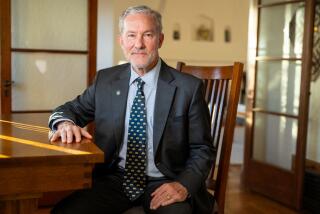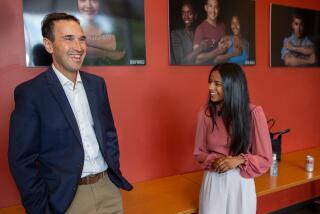Formality Takes Back Seat as Yale Gets a New Leader : It’ll be ice cream, cookies for Richard Levin’s inauguration. Inclusive spirit fits his mission.
- Share via
NEW HAVEN, Conn. — There will be no formal dinner for well-heeled alums when Yale University inaugurates its new president on Saturday. Instead, there will be ice cream and cookies for the city and a rock band for the undergraduates.
This inclusive, almost Clintonian spirit fits the mission of Richard C. Levin, chosen last spring in the hope that he would heal the campus’s weary spirit after years of bitter administrative turmoil.
The celebration also suits the hostile intellectual and economic climate in which Yale and other universities find themselves as they wrestle with rising costs, dwindling federal money and an often unsympathetic public.
“All of this makes for a nightmare,” said Stanley Katz, president of the American Council of Learned Societies in New York City. “Why any rational person wants to be a university president right now, I really don’t know.”
Levin’s rationality, however, is not being questioned this week. Professors and students praise the 46-year-old economist as open-minded, “broad-gauged” and “wonderfully decent.” They say he combines an unusual analytic ability with the personality to get things done.
Werner P. Wolf, chairman of Yale’s applied physics department, recalled watching Levin at a recent meeting with undergraduates. Wolf said he was struck by “the extremely civilized and pleasant atmosphere.”
That represents a sharp change from just 18 months ago, when the administration of then-President Benno C. Schmidt Jr. set off a faculty rebellion by proposing to cut 11% of the faculty of arts and sciences. The staff cuts, including the elimination of entire departments, were intended to raise money to renovate the campus--a scheme that split the faculty bitterly and led to charges that Schmidt was favoring buildings over people.
The dean of Yale College, the university provost and Schmidt all resigned within a few months. Their plan was dumped. There followed an exhaustive, worldwide search for Schmidt’s successor that led to Levin, a San Francisco native who had spent his entire career at Yale.
“I think we learned a lesson from this period,” Levin said in an interview. “I think it was basically a misconception to try to take whole areas of human knowledge and carve them out of the pie.”
On a warm, rainy afternoon this week, Levin sat in his new office--a bespectacled, unpretentious and approachable man, drinking a Diet Coke in an antique rocking chair beneath a landscape painting by Albert Bierstadt.
While unquestionably a Yale insider, Levin is not typical of Yale presidents. He grew up in California and got his undergraduate degree in history from Stanford, not from Yale College.
Levin also happens to be Yale’s first Jewish president--in a school that limited Jewish enrollment until the 1950s. And he also is believed to be the first president in recent memory to have graduated from a public high school.
“Those are all things that just symbolize, I think, Yale being a different place than it was 40 years ago,” he said. “Internally, at least, this is very much a meritocracy.”
Although Levin is little known outside Yale, he has other virtues. A former graduate school dean and economics department chairman, he knows the place well. He is an experienced administrator, and he understands numbers.
All of which might come in handy in sorting through the politics and economics of the university, which last year squeezed its deficit down to $14 million. It hopes to balance its $810 million budget four years from now.
The cost of a year at Yale College has topped $25,000, straining the school’s commitment to “need-blind admissions” under which it ignores applicants’ ability to pay, then offers financial aid to those who need it.
New Haven, too, poses problems for Yale (and vice versa). Its major industry, firearms, long ago left the city. Unemployment, racial conflict, drugs and crime all plague the city.
“There has been some concern about Yale,” Levin said. “ . . . The perception that New Haven is unattractive has hurt us at the undergraduate level.”
Levin grew up in San Francisco’s Marina District. His father was a liquor-importing company executive. His mother’s family had built a wig and makeup company into the principal costumers for opera west of the Mississippi.
After Stanford, Levin spent two years at Oxford (crossing paths with then-Rhodes scholar Bill Clinton). He got his PhD from Yale and joined the faculty in 1974. His wife teaches English there. They have four children.
When asked what he might hope to accomplish, Levin lapsed into the language of the embattled. He spoke of “preserving” and “hanging onto” Yale’s combination of research and commitment to teaching.
“If we can keep this a place where open discussion, toleration and truly free expression and free inquiry prevail at a time when there’s all kinds of pressures working against that, I’d be very proud,” he said.
More to Read
Sign up for Essential California
The most important California stories and recommendations in your inbox every morning.
You may occasionally receive promotional content from the Los Angeles Times.













